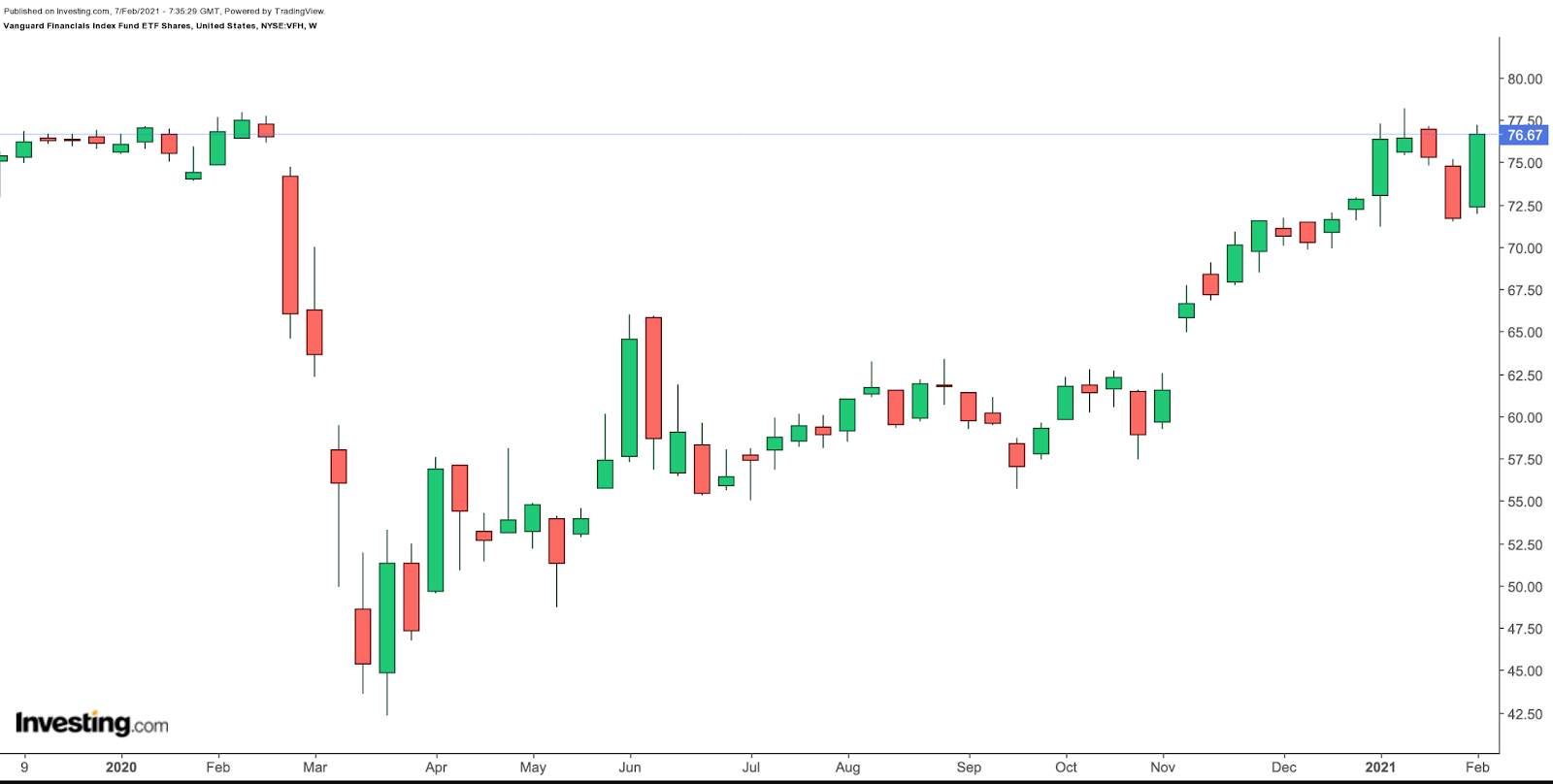Financial services and bank stocks are in the spotlight as the likelihood of an additional US fiscal stimulus package increases. In 2020, financial shares underperformed, but renewed hopes for better returns in 2021 mean more capital is likely to go into this sector.
Therefore, today’s post looks at an exchange traded fund (ETF) that focuses on financials.
Highly Cyclical Sector
The term "financial services" is mostly associated with banks. As banking is a significant part of the financial industry, bank shares get the most attention, especially during earnings seasons. But insurance firms, financial technology (fintech) companies, real estate investment trusts (REITs), asset managers, brokerages, stock exchanges and financial data providers are also part of this sector.
The segment is cyclical. Changes in economic outlook, such as economic growth, interest rates, housing market activity, global health, political and trade developments, affect financial firms.
There are encouraging signs that the US economy might soon recover from the uncertainty of the pandemic. Boston Federal Reserve Bank President Eric Rosengren believes the second-half of 2021 will see robust recovery. So do other Fed regional bank presidents.
Yet, job losses are still part of the economic reality. On Feb. 5, the US Labor Department released the "Employment Situation Summary" for January. Although the economy added 49,000 jobs, analysts concurred labor market growth has stalled, adding to the argument for more fiscal support.
President Joseph Biden recently noted, "4 million people have been out of work for six months or longer and 2.5 million women have been driven from the workforce."
Because of these job losses, one primary concern for banks has been credit risk. Increased unemployment can understandably lead to difficulty for borrowers to cover their outstanding debt. Over the past year, banks have made extensive provisions for bad debts.
With more money in the pockets of consumers and small businesses in the coming weeks, analysts believe charge-offs, or the debt that is unlikely to be collected by creditors (such as banks), may not see an uptick. Similarly, nonperforming loans (NPLs) can stay steady, too. The US defines NPLs "as loans past due more than 90 days and nonaccrual loans (i.e., loans on which a bank has ceased to accrue interest)."
Increased NPLs mean reduced earnings for banks. Such factors can weigh on a bank's soundness, which can affect the economy as a whole. Therefore, increased stimulus can help many banks avoid loan losses.
Another headwind has been the low interest rate environment. Commercial banks issue loans, which comprise most of their assets. Deposits, which depositors or creditors can sometimes demand at will, make up a significant part of their liabilities. In general, assets (i.e., loans) have longer maturities than liabilities.
Commercial banks typically profit from the spread between deposit rates and loan rates. Thus, banks prefer to lend money at a higher rate than the interest they pay out to depositors. High-interest rates help improve banks' margins and profitability. Markets are beginning to price in higher interest rates by 2023, a factor that could support bank shares.
Finally, following healthy stress tests in December, the Fed now allows US banks to issue share buybacks. Seasoned investors prefer holding bank shares as they are typically known for dividends and stock repurchases. Following the Fed's decision, JPMorgan Chase (NYSE:JPM) announced a new share repurchase program of $30 billion. So far in 2021, JPM stock has returned around 9%.
With that, here is our fund for today.
Vanguard Financials Index Fund ETF Shares
- Current Price: $76.67
- 52-Week Range: $42.34 - $78.17
- Dividend Yield: 2.1%
- Expense Ratio: 0.10% per year
The Vanguard Financials Index Fund ETF Shares (NYSE:VFH), which has 412 holdings, tracks the returns of the Spliced US IMI Financials 25/50 index. The fund started trading in January 2004 and assets under management stand around $7.3 billion.
The top four segments represented are Diversified Banks, Regional Banks, Asset Management & Custody Banks, and Financial Exchanges & Data. Over 40% of the fund's total net assets consist of the top ten firms. VFH's largest names include JPMorgan Chase, Berkshire Hathaway Class B (NYSE:BRKb), Bank of America (NYSE:BAC), Citigroup (NYSE:C), Wells Fargo (NYSE:WFC) and BlackRock (NYSE:BLK).
Clearly, the holdings also include investment banks that have performed better than commercial institutions, thanks to strong results in securities-trading and capital markets, particularly in asset management as well as fixed income.
Over the past 12 months, VFH is down 0.56%. But year-to-date (YTD), it has returned 5.24%. We like the diversification and the dividend yield of the fund. Buy-and-hold investors who buy the dips are likely to see further capital appreciation in the coming quarters, too.
Bottom Line
There is a diverse range of financial sector funds, ranging from US-based large-caps to regional banks to global firms. Other ETFs that deserve readers' attention could include:
- Fidelity® MSCI Financials Index ETF (NYSE:FNCL) — up 5.38% YTD
- Financial Select Sector SPDR® Fund (NYSE:XLF) — up 4.78% YTD
- iShares Global Financials ETF (NYSE:IXG) — up 3.87% YTD
- iShares U.S. Regional Banks ETF (NYSE:IAT) — up 10.34% YTD
- SPDR® S&P Regional Banking ETF (NYSE:KRE) — up 13.47% YTD
- SPDR® S&P Bank ETF (NYSE:KBE) — up 10.09% YTD.
As always, readers need to conduct their own due diligence and inspect a given fund's holdings in light of personal risk/return profiles.
